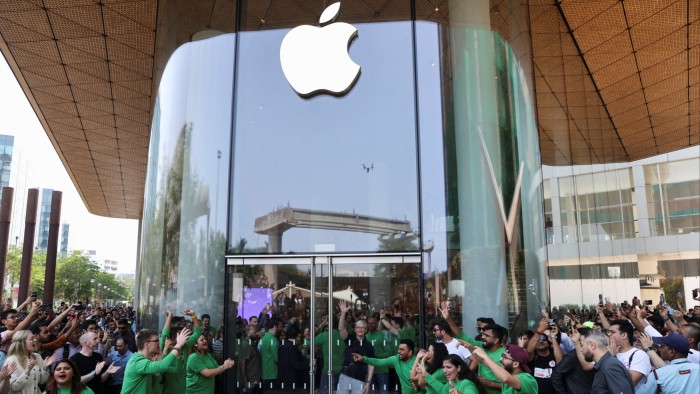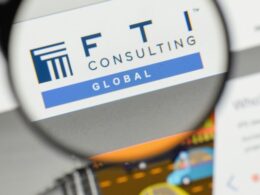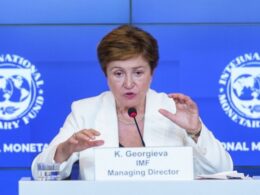This article is an on-site version of our FirstFT newsletter. Subscribers can sign up to our Asia, Europe/Africa or Americas edition to get the newsletter delivered every weekday morning. Explore all of our newsletters here
Good morning, happy Friday and welcome to FirstFT Asia. In today’s newsletter:
-
Trump lashes out at Apple’s pivot to India
-
The deep-sea mining “gold rush”
-
Why China’s CATL needs a blockbuster share sale
Donald Trump has hit out at Apple’s plans to produce more iPhones in India as a way of avoiding US tariffs on Chinese-made goods, as he continues to push the tech group to manufacture its best-selling device in America.
Trump’s comments: Speaking in Qatar on the second leg of his Middle East tour, the US president said he had “a little problem with Tim Cook yesterday” after the Apple chief executive confirmed last week that Indian factories would supply the “majority” of iPhones sold in the US in the coming months. (The FT previously reported that Apple planned to shift the assembly of all US-sold iPhones to India by the end of next year.) Trump said he told Cook: “We are treating you really good, we put up with all the plants you built in China for years. We are not interested in you building in India.”
What this means: Trump’s comments signal a cooling in the president’s relationship with Apple, one of the US’s most valuable companies. It comes as the iPhone maker already faces huge challenges in replicating its vast Chinese supply chain and production facilities in the US, which rely on a skilled high-tech manufacturing workforce that is now overwhelmingly concentrated in Asia.
Implications for India: Apple’s pivot to India is the highest-profile result of Prime Minister Narendra Modi’s drive to boost local manufacturing and attract companies seeking to diversify away from China. Trump’s criticism of these plans come as India and the US — its biggest trading partner — are negotiating a bilateral trade agreement. Read the full story.
Here’s what else we’re keeping tabs on today and over the weekend:
-
Economic data: Japan, Malaysia and Hong Kong report first-quarter GDP figures.
-
EU-UK relations: UK Prime Minister Keir Starmer is expected meet EU leaders in the Albanian capital of Tirana for last-ditch talks to end an impasse over a post-Brexit “reset” deal.
How well did you keep up with the news this week? Take our quiz.
Five more top stories
1. Trump has said that “nothing is going to happen” on a Russia-Ukraine peace deal until he and Vladimir Putin meet. The US president’s comments damped expectations for talks between Russian and Ukrainian ministers due in Turkey, their first meeting since 2022.
2. US cryptocurrency exchange Coinbase has been targeted by hackers who stole customer data and demanded $20mn to prevent its public disclosure, the company said yesterday. The group, which is set to become the first crypto exchange to join the S&P 500 on May 19, said the hackers’s goal “was to gather a customer list they could contact while pretending to be Coinbase — tricking people into handing over their crypto.” Read the full story.
3. A Ukrainian man has been charged in connection with arson attacks on properties and a car linked to UK Prime Minister Sir Keir Starmer. The charges against Roman Lavrynovych, 21, relate to three incidents in north London in the past week, including a fire at Starmer’s family home in Kentish Town on Monday and an earlier car fire on the same street.
4. Scientists in the US have performed the first personalised gene therapy on a child with a life-threatening rare disease, raising the prospect of similar bespoke treatments for many other disorders. Researchers and clinicians used Crispr gene editing technology to correct a liver cell mutation in the six-month old, who quickly showed signs of better health.
5. EY has delayed start dates for graduates hired by its US strategy and deal advisory business for the third year in a row. The move comes as the Big Four firm grapples with a sluggish market for mergers and acquisitions and broader economic uncertainty.
The Big Read
Deep-sea mining has been a fantasy for a century or more. Yet as competition for critical minerals used in batteries, power grids and steel manufacture grows fiercer the issue has been thrust into the spotlight. Donald Trump last month made it clear he wants the US to lead the search for the materials that can be found under the sea. But environmentalists worry it will damage one of the planet’s last untouched ecosystems and others say it is prohibitively expensive. Today’s Big Read explore the risks and potential rewards of the deep-sea mining “gold rush”.
We’re also reading and listening to . . .
Chart of the day
CATL’s secondary listing in Hong Kong is set to raise $4.6bn and would be the world’s biggest so far this year. For Robin Zeng, founder of the Chinese battery giant, the secondary listing marks the culmination of a years-long effort to access foreign capital to fund plans for aggressive overseas expansion.
Take a break from the news
Is reading in decline, again? Multiple news stories have reported concerns that Gen Z aren’t reading for pleasures, but Nilanjana Roy argues that this panic is overblown.

Source link










